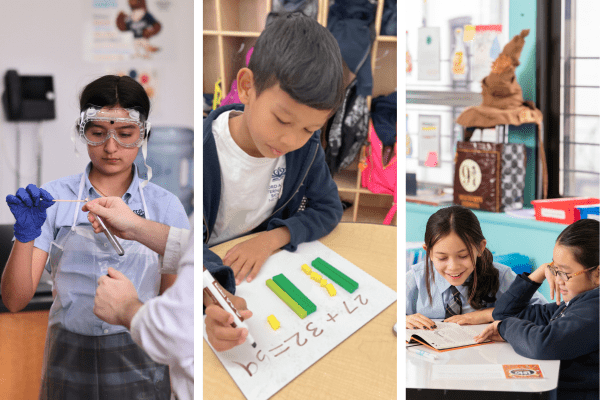Why is it important to teach entrepreneurial skills?
Enterprise Week bridges the gap between school and the workplace. Read on to hear why we teach Enterprise Education here at NAISNY.

Enterprise Week at Nord Anglia International School New York offers a unique opportunity in the school calendar to bridge the gap between school and the workplace. In our annual Enterprise Week challenge, Nord Anglia students develop and hone their research and entrepreneurial skills, learn about pricing, sales and advertising as well as find sustainable ways to make money. They spend the week working out their ideas and the week’s efforts culminate in a school-wide fair where classes compete to sell their products to the school community. Each year is different, and in this year’s task, students were asked to make and sell items for our sustainable holiday fair which aimed to raise awareness of the UN Sustainable Development Goals.
Students were asked to think about sustainability as a part of the challenge because it adds an aspect of considering our own levels of consumerism at this time of year. It also means that students get to see the real difficulties behind creating a truly sustainable product that will also make a profit. Students learn about the Sustainable Development Goals throughout their curriculum, and they have a real desire to ensure they are being considerate global citizens as well as entrepreneurs.
The Benefits of Teaching Entrepreneurial Skills
The benefits of teaching entrepreneurial skills to students are many. Entrepreneurial people tend to do better in the workplace, whether they work for themselves or someone else. When our students develop their entrepreneurial skills, they utilize skills such as problem-solving, communication, teamwork, time management, innovation, collaboration and leadership.
The most successful classes, whether they make the most money or create the best product, tend to be creative, determined, flexible, adaptable and resilient. Resilience can be particularly important when a plan fails, students need to pick themselves up and think again about the best way forward. An education in enterprise teaches students that to fail is not always negative. Students are taught to develop, improve and reconsider their ideas. They learn that failure can sometimes be just as important and useful as success.
Collaboration between students is another key feature of Enterprise Week. Students need to work together and listen to each other’s ideas. They need to be flexible and be open to criticism of their own ideas. The week’s learning is child-led: teachers are there to assist but not lead. This builds student confidence, strengthens skills in teamwork and, for some, in leading others.
One of the most important things about Enterprise Week is that students really enjoy it! Their passion and enthusiasm is conveyed from the moment that ideas are conceived until the last moment of the Enterprise Fair. Read on to hear what some of our classes got up to during this week's Enterprise Week and please look at the pictures in the gallery!
Year 1
Year 1 were inspired by sustainable development goals, 8 and 12 and made and sold hot chocolate for Enterprise Week. They supported 'decent work and economic growth' by buying only fair-trade products. They supported 'Responsible Consumption and Production' by using re-usable cups for their hot chocolate and washing up on the spot!
Year 2
Year 2 thought about how to use less and waste less while they were creating their Enterprise projects this week. They linked their project to their current IPC theme, 'People of the Past', by learning about how the Victorians invented many of the Christmas traditions that are still a huge part of how we celebrate today. They upcycled donated clothing and learned basic sewing to make festive garlands, which they decorated with eco-friendly glitter made from plant fibers. They rescued an old book from the recycling bin and turned it into 3D hanging decorations. They also are made Christmas crackers by wrapping paper towel tubes in old newspaper and filling them with unwanted toys, scrap paper crows and jokes written on scrap paper. Finally, they made dried citrus and clove decorations and pomanders that can be used year after year. Through this entire project, the students learned that you can made amazing decorations while still caring for the environment, using less and wasting less.
Year 3
In Year 3, the students created a 'Kindness Rocks' holiday rock finding game to help raise awareness of the first 5 SDGs. First, they used the internet to research facts about 5 of the SDGs, then they created list poems to help share the facts and raise awareness of the goal. Next, they carefully painted a holiday design on each rock to represent one of the 5 SDGs. Finally, they completed problem-solving questions, consolidating their learning of counting in multiples of 50 and 100 and addition and subtraction to calculate how much profit they could make if we had different amounts of visitors to their stall!
Year 6
Year 6 created mini golf, a bowling alley and a ring toss out of recycled goods. They have also designed some festive motifs for face painting. To ensure they are even more sustainable they have rented the face paints from the Drama department, so that they didn't incur any additional waste. The class got creative in creating origami holiday ornaments out of recycled paper.
Happy holidays to all from everyone at Nord Anglia International School New York!








